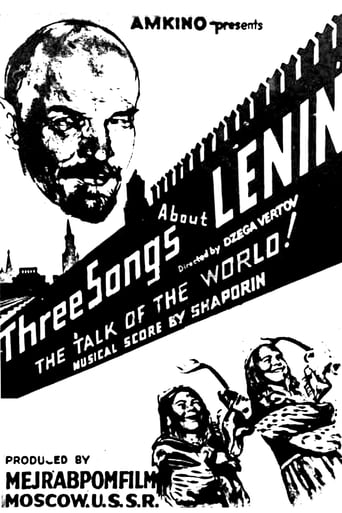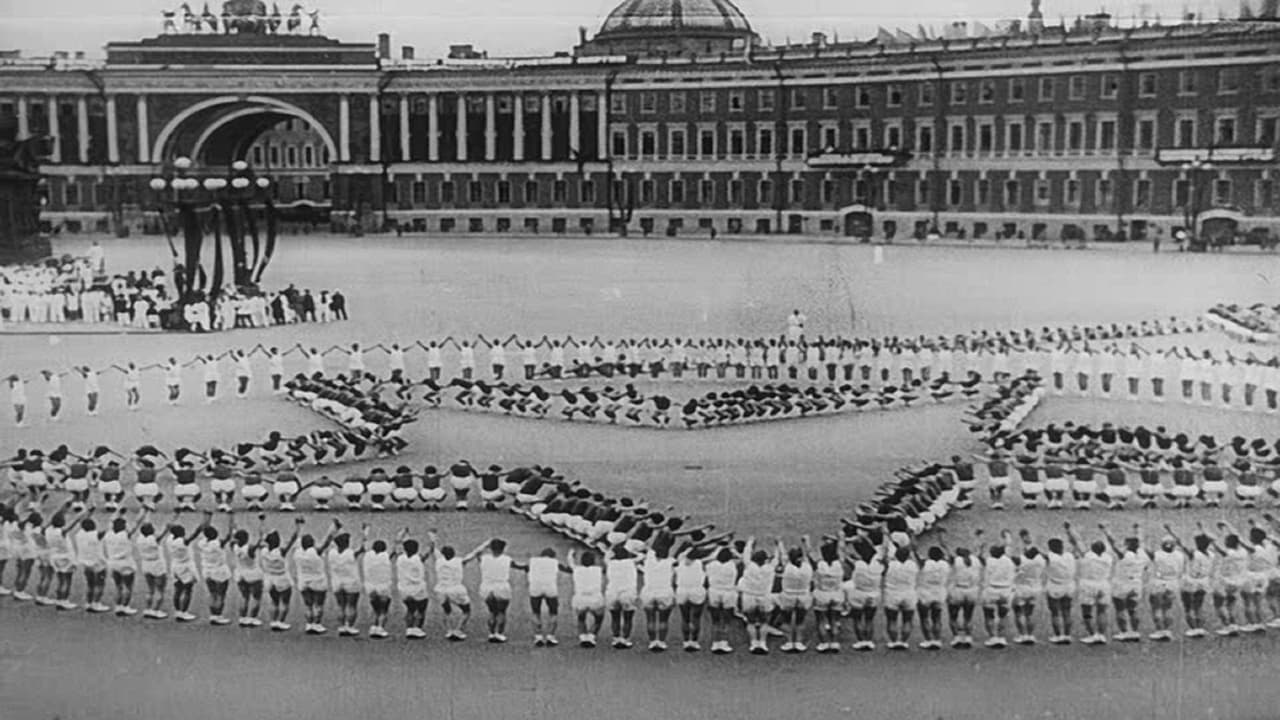Emil Bakkum
Let us start with a review about the film itself. The first time I saw "Three songs about Lenin", it was in a small picture-theater, together with perhaps ten other paying visitors. I was emotionally moved by the images, which is alway a rare experience for me. Later I bought the DVD, and I still consider it as an asset. The primary cause is probably the enormous feeling of optimism, that is beamed forth by the scenes. On the one hand the optimism is substantiated by the shots of emerging industries and education and development. On the other hand, the optimism is impersonated by close-ups of the common people, by their hopeful gazes, pondering over a better near future. The film invites the viewer to empathize and identify: what are their hopes and prospects? We want to be a part of this achievement and mix with the crowd. This technique is an excellent find of Vertov. Joris Ivens may have had this example in mind, when he made the film "Power and the land" (1940) for the US Ministry of Agriculture, advocating the New Deal of president Roosevelt. The thread in Vertovs film is the development policy for Russia, which was started by V.I. Lenin. Its symbol is the garden seat, where Lenin used to rest during his final days, suffering from a fatal illness. A striking detail is the missing lath in the seat, reminding us of earthly perishableness. Vertovs first song, titled "My face was in a dark prison", pictures the backward Islamic states in Russia, probably in Middle-Asia. We see women veiled in burkas and crippled men. But there is hope, some young women throw off their veils and start to study (the works of Lenin). The first tractors appear on the fields, the first automated looms are installed. At times our joy is somewhat tempered, for instance when a text exclaims "We would gladly die if only Lenin could have lived on". The second song, "We loved him", is essentially about Lenins burial and the feelings of mourning, that were engulfing the people. It also contains flashbacks of Lenins public appearances. We get a taste of his enthusiasm and passion. The third song, "In a big city of stone", shows the economic accomplishments from Lenins death (1924) until the making of the film (1934). They are indeed impressive: the steel mills, the electrification, the oil fields, the education, the airplanes, the new blocks of flats, etc. All realized without foreign capital, even while starting in 1917 with an extremely primitive society. "If Lenin could just have seen this progress", the film ponders. So my cinematic part of the review can only praise the quality of the film. Nevertheless, we are also interested in the credibility of the suggested state of affairs. The production took place in 1934, when the Stalinist oppression had already unfolded. Was Lenin really a kind of Ghandi, a father to the people? Let me first comment on the glorification, which seems contradictory to the nature of a popular movement (in the eastern part of Berlin there used to be a statue of Lenin with a height of 17 meters!). This is because the people were supposed to elevate and to exceed their production plans, and therefore an example of the utmost dedication was needed. Undoubtedly Lenin was excessively devoted to the wellbeing of the people, and he has probably worked himself to death. But how sound were his ideas? Just some background information for your convenience: Lenin was formed as a social-democrat politician during the cruel and primitive reign of the last Russian Tsar (forgetting Stalin). The Russian society was still largely agrarian and religious and uneducated, except for a small bourgeois elite. In this Russian elite Lenin became one of the outstanding social-democrat leaders, while the vehement tsarist oppression forced him to advocate a radical oppositional resistance. He also became a journalist and writer. He published many ground-breaking books (in my opinion), like the philosophical "Materialism and empiriocriticism", the practical "What to do?", the economic study "Imperialism as the final stage of capitalism", and the political study "State and revolution". However, the First World War in Russia was especially gruesome, which accelerated the radicalization of Lenin. When in 1917 the Tsar was overthrown by a civil revolution, Lenin decided contrary to his former beliefs to follow up with a communist revolution, which unfortunately succeeded. It started a civil war, which caused the utmost misery and famine, and ruined the already collapsing economy. Of course the new regime could only survive as a dictatorship, and it soon developed the most brutal and abject traits. During this episode Lenin officially declared the communist terror as the instrument to combat any opposition. For example, in his final years he declared that "the revolutionary courts must execute the Mensheviks (EB: they were left-wing reformers and former party comrades of Lenin!), when they continue to voice their opinions". Of course his orders were duly executed by his primitive followers. It is sad to see a brilliant mind lose contact with reality. So Lenin was actually the INVENTOR of the Stalinist terror (and all those clones like Mao and the Red Khmer). So, NO! the film is a fake, but nevertheless the young Lenin deserves our appreciation.
netwallah
Vertov eulogizes Lenin with an idealized view of Soviet progress. There are, indeed, three songs, or three musical movements. The first presents a woman's view of Lenin's legacy, beginning with the movement away from various forms of repression, the joy of women working, the new equality in field and factory. The second records the Soviet mourning for their leader. The third showcases progress, with the refrain if only Lenin could see his country now. With the exception of three or four spoken passages, this is built like a silent film to which a programmatic soundtrack has been added. There are actual songs, with titles furnishing the words, and sections of great music by Russian classical composers, and some music probably written for the film. The continuity comes through the songs and through several thematic sequences of imagesthere is no plot. The images are fascinating, showing the best side of Soviet culture, the variety of ethnicities, the joy of having enough to eat, the sense of sharing in a wonderful experiment, the determination to succeed, the unselfishness of many individuals, the idealism of the collective. There are thousands of shots of people, agriculture, industry, public works, parades, happy people, hardworking people, landscapes, and every sort of window into a vanished world. Of course it's propaganda. Of course there are essential elements of Soviet history omitted. Of course the very first sequences present the unveiling of Muslim women as a great stride toward liberty. Let the political scientists and historians investigate the significance of what is left out and what is presented in this partial view of life in the 1930s. But remember it was only sixteen years after the October revolution, and the progress the movie highlights did occur. Still, we don't have to accept the propagandistic aspect of the film. Neither do we have to reject the film out of hand because we think Communism is stupid, nor does it benefit anybody to heap ridicule upon it. Three Songs is a (partly) great movie because it shows irreplaceable real images of real people and of vanished technology and vanished historical places. Some of the photography is amazing, and the editing, timed rhythmically to match the music, is unusually good. Even the way the propagandistic themes are built is worth examiningwe're all pretty much safe from its baleful influence these days.
Snow Leopard
Despite the good imagery and photography, this Dziga Vertov feature, though often interesting, is in general rather a disappointment.There are many fine features from the Soviet cinema of the 1920s and 1930s, in which the skill of film-makers like Eisenstein, Dovzhenko, Vertov himself, and others far outweighs any small doses of politically-mandated content. It is unfortunate that some very elegant films of that era are often described as propaganda pieces, when they actually have far too much depth for that label to be appropriate. All this is simply to say how unfortunate it is to have to point out that, indeed, "Three Songs of Lenin" might have been much, much better without the heavy-handed propaganda statements with which it is laced.There's no reason in itself why a film praising Lenin could not still work as cinema, and indeed at least two of the three "songs" contain some worthwhile ideas. But the title cards and some of the dialogue simply go way too far in trying to build up Lenin's legacy, and it is not long before it gets to be too much. The lavish praises that the movie heaps upon him would be ridiculous even if they were being applied to Washington, Churchill, de Gaulle or any other world leader. No one leader deserves anything approaching that much credit for his country's successes, and no human leader or ruler deserves such unstinting and unqualified praise.Vertov was a skilled and creative film-maker, as he proved in pictures such as "Man With a Movie Camera". And even here, there is plenty of good photography and other material to work with. A more restrained approach would have resulted in a much better film. It's still of interest to those interested in the era, and it does have some definite strengths; it's just not nearly as good as you could have hoped for it to be.
BoYutz
This 1931 'documentary', acclaimed in its day, is nothing more than a ham-fisted, banal, and unremarkably filmed piece of propaganda. The editing is jerky; the shots frequently undisciplined and poorly composed; the pace glacial; the script naive and stilted in its crass deification of Lenin. Oh yeah, it's dour and humorless, too.It might hold some interest as an early example of the 'tractors and dams' approach to agitprop, but it holds little interest on its own merits. It is worthwhile, however, to see Lenin threatening to defeat 'the landowners and capitalists' around the world!Keep an eye out for this in your film history class, and be ready for your indoctrination.


 AD
AD


